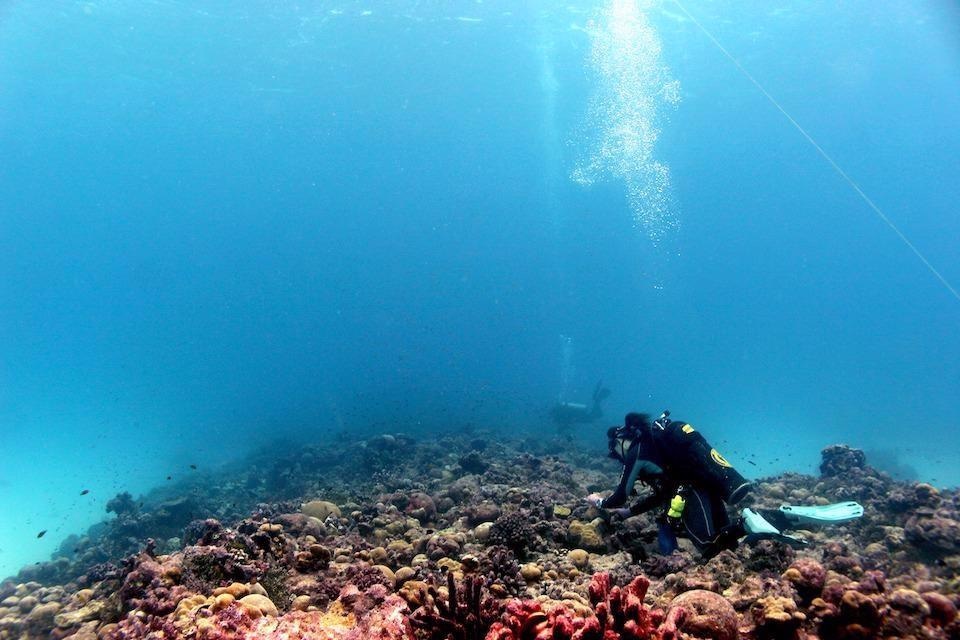
UVic marine biologist Julia Baum sampling Platygyra colonies on Kiritimati (Christmas Island), 2019. Image Credit: Kristina Tietjen.
Coral reefs could bounce back from bleaching caused by soaring temperatures new research suggests, but only in the right conditions.
Coral reefs have provided researchers with some hope that at least one element of nature could ‘bounce back’ from soaring temperatures and a global heatwave induced by climate change — but, only with a very specific plan of action in place.
Biologists from the University of Victoria (UVic) report that some corals have displayed unexpected resilience to rising ocean temperatures driven by unprecedented heatwaves. The discovery has positive implications for the long-term survival of coral reefs in the face of global warming.
The team’s findings are discussed in a paper published in the journal Nature Communications¹.
The devastating effects of climate change on coral reefs are well known. Finding ways to boost coral survival through marine heatwaves is crucial if coral reefs are to endure the coming decades of climate change.
Julia Baum, Study Senior Author and Marine Biologist, University of Victoria
The UVic scientists were part of a larger international team of biologists that tracked hundreds of coral colonies on reefs located around Christmas Island — also known as Kiritimati. This study took place during the 2015–16 El Niño — a large-scale ocean-atmosphere climate interaction which is connected to periodic warming in sea surface temperatures across the central and east-central Equatorial Pacific.
This is a significant period as El Niño events and the heat stress they cause are thought to be a major contributor to ‘coral bleaching’ and even the death of corals.
Mass Coral Bleaching Events and Their Effects
Coral bleaching occurs mainly when waters become too warm and heat stresses cause corals to expel the algae (zooxanthellae) living in their tissues. As the name of the process suggests, this causes a whitening of the coral’s tissues.
The effect goes far beyond the superficial, however.
The algae expelled during the process — which can also be caused by other factors such as pollution and over-exposure to sunlight — serve as the coral’s major food source and protection against disease. And thus the breaking of this symbiotic relationship can cause the death of the coral.
As a striking example of this, in 2005 half the coral reefs in the U.S Caribbean were wiped out in a mass bleaching event when warm waters centered around the northern Antilles near the Virgin Islands and Puerto Rico expanded southward. Researchers estimated from satellite data that the coral's thermal stresses in that particular event were greater than the cumulative stresses of the past twenty years.
The heat stresses caused by the 2015–16 El Niño sparked the third-ever global coral bleaching event — and at its epicenter was Christmas Island, which experienced a heatwave that lasted a stunning ten months.
If all this seems bleak, there is some hope. Coral can ‘rebound’ from bleaching, reclaiming its food source and recovering its health. And the new study shows that coral may be more resilient to heat stress and its effects than previously believed.
The Wider Impact of Coral Bleaching
Recovery from coral bleaching has been observed in corals before, but until this new study it was only thought to occur when water temperatures cooled, thus removing the heat stress that had triggered the process initially.
During the course of their study, the UVic researchers noticed something unexpected. Corals were recovering from bleaching whilst still in waters with elevated temperatures.
It should be pointed out that whilst providing some relief, the recovery that the team observed comes with some very specific caveats. The corals they examined existed in conditions that will not be available to many colonies. Namely, in the absence of other stressors that can result in bleaching.
The corals survived by the distribution of heat-resistant symbiote through their tissues. Corals in areas that are more subject to stressors like sunlight exposure and pollutants are already dominated by these more heat-resistant life-forms. Thus, what the team label in their paper as the ‘pathway to survival’ demonstrated in these corals will not be available to the majority of the world’s coral colonies.
The finding makes a strong case for the reduction of human-based factors like pollution and the development of an innovative strategy for survival to support coral recovery.
Observing corals recovering from bleaching while still baking in hot waters is a game-changer. We’ve found a glimmer of hope that protection from local stressors can help corals.
Julia Baum, Study Senior Author and Marine Biologist, University of Victoria
Coral recovery during prolonged heatwave offers new hope
UVic biologists have discovered how some corals managed to survive a globally unprecedented heatwave, in a first-ever study that provides new hope for the long-term survival of coral reefs in the face of climate change. Video Credit: University of Victoria.
References
¹ Claar. D.C., Starko., Baum. J.K., et al, [2020], ‘Dynamic symbioses reveal pathways to coral survival through prolonged heatwaves,’ Nature Communications, [https://doi.org/10.1038/s41467-020-19169-y]
Disclaimer: The views expressed here are those of the author expressed in their private capacity and do not necessarily represent the views of AZoM.com Limited T/A AZoNetwork the owner and operator of this website. This disclaimer forms part of the Terms and conditions of use of this website.